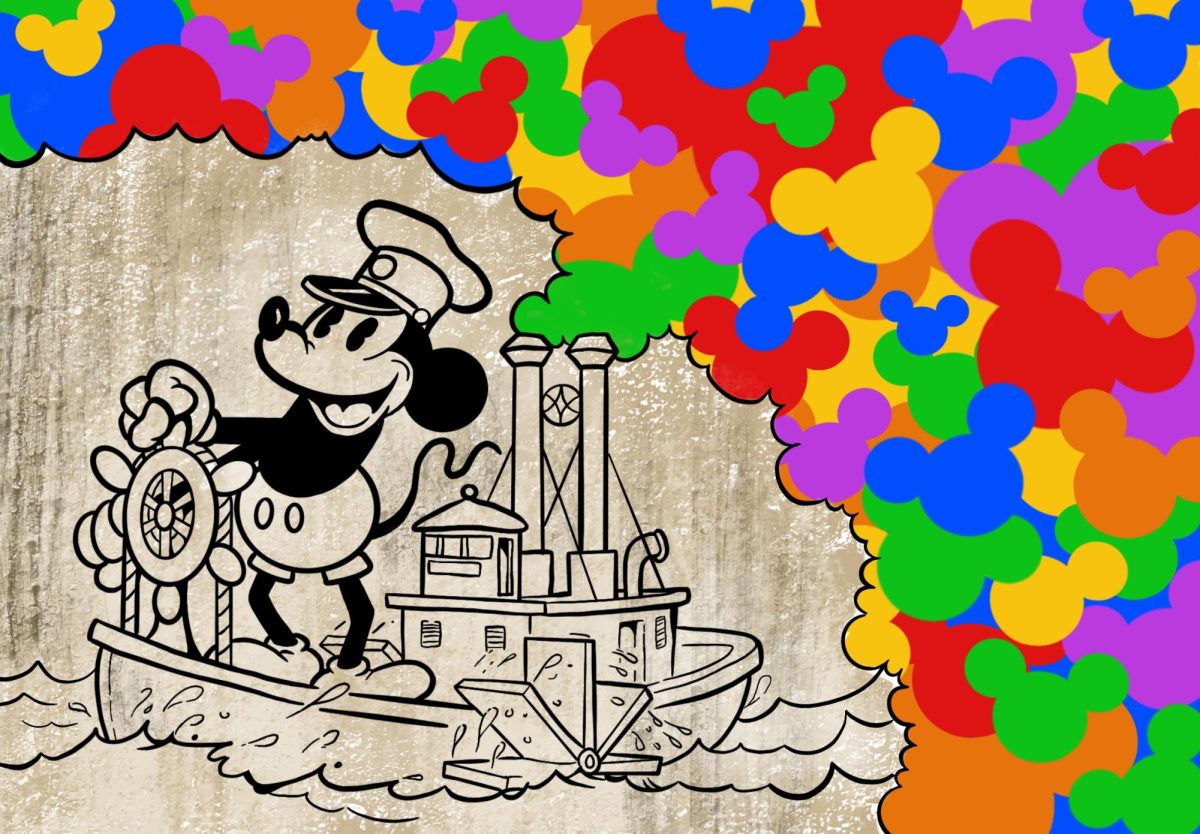Among the cheers of champagne glasses and clusters of colored confetti, when the ball dropped on New Year’s Eve, it didn’t simply bring the typical hopes and anxieties towards the new year. On Jan. 1, 2024, in all its black and white glory, the first edition of our beloved childhood icon, Mickey Mouse, entered the public domain.
When I saw the news all over the internet, I was puzzled as to what it meant, but I was curious to understand what the future held in store for the nostalgic character who grew up with all of us.
It’s important to clarify what the US copyright laws are. The Copyright Office of the United States maintains that copyright protects intellectual property by giving ownership to the person/group who created it. Second, every copyright has an expiration date, typically the duration of the author’s lifetime with an additional seventy years, causing the intellectual property to enter the public domain, which means that anyone is free to use that material for their creative projects.
In my research on Mickey Mouse’s copyright, I found some information from Duke University’s Law School written by Jennifer Jenkins, the Director of the Duke Center for the Study of the Public Domain, which stated that “it is the story of a 95-year-old love triangle, a tangled drama that rivals any Disney movie for twists and turns. The protagonists are Mickey, Disney and the Public Domain, and their relationship positively exemplifies the social media weasel words “it’s complicated'”. As Jenkins shows throughout her research, Disney loves the public domain but has been very protective over its copyrighted property from going into the public domain. In 1998, Disney worked hard to push the expiration date of their copyright on the first edition of Mickey Mouse, Steamboat Willie, with the Copyright Term Extension Act, extending it to 95 years, which also became known as the “Mickey Mouse Protection Act.” Disney themselves have been keen on capitalizing on the public domain with examples such as Snow White using the Grimm brothers’ fairytale of the same title and taking Shakespeare’s Hamlet as inspiration to Lion King.
“Why should this matter?”, I would argue that the public domain has been the supplier of many creative works that have unified people all over the world; history would not be the same without it. Humans are creatures of creativity and most of all, collaboration; within each of our hearts, there is a pulsating and innate desire to connect. We are naturally inspired and prompted by the perspectives of others, which is why, like Lion King, some of the most beloved works within pop culture have been inspired by works in the public domain. Shrek 3, inspired by the Legend of King Arthur and Clueless, inspired by Jane Austen’s Emma are all additional examples.
However, with the first edition of Mickey Mouse freshly released into the public domain, I must heed that very interesting and unexpected things have been done with the public domain. Some of which, some may argue, are not honoring the original intellectual property. For instance, Winnie the Pooh: Blood and Honey sees A. A. Milne and E. H. Shepard’s beloved children’s story characters, Pooh and Piglet, as the main antagonists portrayed as murderers in a horror film where they terrorize female college students. It is a very stark and dark reality to face when one sees their fictional friends from childhood become bloodthirsty killers, stripping all their innocence and goodness, making it hard to see the characters in the same light again. Those who plan to use the public domain in any form, especially intellectual property with a sentimental attachment like Mickey Mouse, must take into account the responsibility they hold. It could lead to unique uses; when Winnie the Pooh became free to use, Who Gives a Crap, a company based on sustainability, advertised how Pooh and his friends were being affected by deforestation, imploring the consumer to buy their products, recycled and bamboo toilet paper.
So, where does this leave the future of our dear friend, Mickey Mouse?
I don’t know, but boy, am I excited and terrified to find out.






















